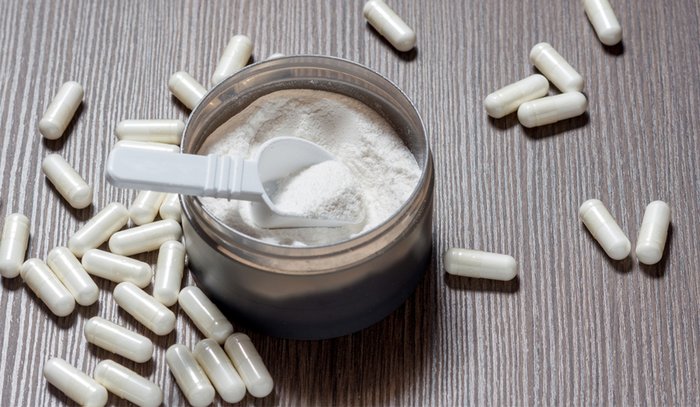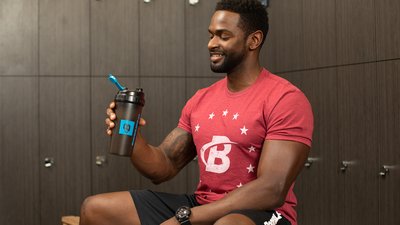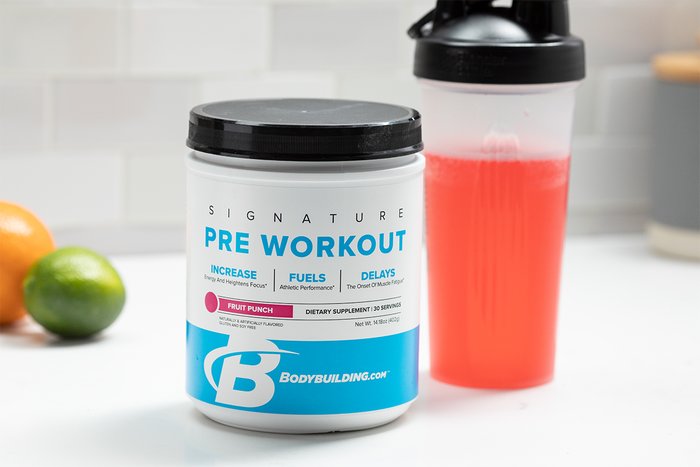There is no shortage of supplements that claim to boost muscle gains, but truly elite physiques are built by hard training and serious nutrition first and foremost. Supplements are just the icing on the cake.
But when your training and nutrition are locked in, these four science-backed supplements can definitely help you get your new physique a little faster, boost the quality of your workouts, and help you recover. Those three things can definitely help you gain weight—the good kind!
Here's everything you need to know!
Creatine
Creatine is a naturally occurring substance within our muscle cells, and it is one of the primary sources of cellular energy. Whenever you blink your eyes, scratch your elbow, chew your food, or perform most other movements, it's creatine—or rather, the creatine phosphate energy system—that's powering you through it.
As a supplement, creatine has been popular since the 1990s, and has been the subject of hundreds of studies since then. It comes in numerous forms, but none have been shown conclusively to be as effective as the cheapest and most popular variety, creatine monohydrate.

Benefits of Creatine Supplementation
- Increased lean muscle mass, particularly with strength training[1,2]
- Improved muscular strength[1,2]
- Decreased muscle soreness and lower levels of exercise-induced inflammation[3]
- Improved blood flow during training[1]
- Improved performance during high-intensity training[1,5]
Many athletes follow a "loading" protocol of around 25 grams a day for five days, but this isn't essential. But as Ciaran Fairman notes in the article "Do I Need to Load With Creatine," you can also get the same benefits with around 5 grams a day, potentially with none of the mild side effects of the loading protocol, which include stomach pain and water weight gain. The catch is that you have to take it consistently. Don't skip it!
Recommended Dose: 5 grams, taken whenever works best for you. If it helps you remember, take half of your daily serving pre-workout, and the second half post-workout.
Beta-Alanine
Beta-alanine is a naturally occurring non-essential amino acid that comes into the body through foods that are rich in protein. The performance-enhancing aspect of beta-alanine (BA) is due to its ability to increase intra-muscular levels of carnosine. Increasing beta-alanine through supplementation may raise carnosine levels by over 60 percent in as quickly as four weeks.[6]
This is significant because during high-intensity exercise, our bodies accumulate a large amount of hydrogen ions, which cause the blood pH to drop. This acidification can cause severe fatigue, decrease muscle performance, and shorten the time to muscular failure. What people chalk up to lactic acid is actually usually happening from hydrogen.
Beta-alanine is thought to "buffer" these ions, delaying the buildup in the blood and allowing you to knock out a few more reps, last longer in your workout, and increase your gains over the long term.
Benefits of Beta-Alanine Supplementation
- Delayed fatigue during intense training[7]
- Increased total training volume[7]
- Improved power production[8]
- Increased muscle building[9]
- Improved endurance during hard training[10]
- Increases effectiveness of creatine, and vice versa[11,12]
Recommended Dose: 4-6 grams per day. Beta-alanine has to be taken regularly to be effective, so don't trust your pre-workout to give you everything you need. Consider taking it in smaller doses throughout the day to reduce the harmless skin-tingling sensation that can accompany higher doses.[13]
Whey Protein
No supplement says "I'm a lifter" as much as the post-workout whey protein shake! And with good reason. Whey protein supplies the body with a high amount of protein and amino acids that help to jump-start the anabolic process.
Whey is most often consumed after a workout to increase protein synthesis and to improve muscle recovery and restoration, although as Nick Coker writes in the article "The Case for Pre-Workout Protein," it can be equally effective when taken before training.

Benefits of Whey Protein Supplementation
- Fast digesting and more easily absorbed than other protein sources[14]
- Increased muscle mass, especially when taken post-workout[15]
- Improved appetite control, and greater feelings of fullness when dieting[16]
- Contains more leucine than any other protein source[17]
Recommended Dose: 20-30 grams of whey protein at a time, preferably before or after a workout. You can also take it as a meal replacement or to boost your protein intake at other times. Supplemental protein should not be your primary protein source, though. You still need to get the majority of your protein from food.
Branched-Chain Amino Acid (BCAA)
Another category of muscle-building supplements that lifters and bodybuilders use to improve their results are branched-chained amino acids (BCAAs), or BCAAs. Of the 20 amino acids that make up protein, just three are referred to as BCAAs: leucine, isoleucine, and valine. These are the specific amino acids that have been shown to stimulate protein synthesis and help regulate protein metabolism.
Benefits of BCAA Supplementation
- Increased levels of muscle protein synthesis[18]
- Decreased levels of muscle damage during exercise[19,20]
- Decreased muscle soreness from exercise[19,20]
- Improved endurance during exercise[21,22]
Recommended Dose: 3-6 grams before or during exercise. A ratio of two parts leucine to one part each of isoleucine and valine appears to be most beneficial. As Krissy Kendall, PhD, explains in "The Top 7 Supplements to Boost Endurance Performance," BCAAs can be just as effective for endurance athletes like runners, rowers, and cyclists as they can be for lifters and bodybuilders.
Caffeine
Pre-workout formulas usually include caffeine to help you perform at full throttle. In addition to getting you stoked to work out, caffeine can lower feelings of exertion, fatigue, and even post-workout soreness. [23,24,25]
Pre-workout supplements help you train harder, keeping both your mind and body in the game for just a little longer. The caffeine jolt can make the difference between a workout that maintains muscle and one that builds muscle.
Benefits of Caffeine Supplementation
- Improved motivation to work out [23]
- Decrease in perceived exertion [23]
- Delayed muscle fatigue [24]
- Increased endurance [25]
Recommended Dose: In Shannon Clark's article, "6 Ways To Get More Energized For Your Workouts", Dr. Chris Lockwood recommends between 1.36 and 2.5 milligrams of caffeine per pound of bodyweight. That would be 200-375 milligrams for a 150-pound person. If that leaves you jittery, try less. Determine your tolerance and find the dose that works best for you.
References
- Earnest, C. P., Snell, P. G., Rodriguez, R., Almada, A. L., & Mitchell, T. L. (1995). The effect of creatine monohydrate ingestion on anaerobic power indices, muscular strength and body composition.a> Acta Physiologica Scandinavica, 153(2), 207.
- Kilduff, L. P., Pitsiladis, Y. P., Tasker, L., Attwood, J., Hyslop, P., Dailly, A., ... & Grant, S. (2003). Effects of creatine on body composition and strength gains after 4 weeks of resistance training in previously nonresistance-trained humans. International Journal of Sport Nutrition and Exercise Metabolism, 13(4), 504-520.
- Santos, R. V. T., Bassit, R. A., Caperuto, E. C., & Rosa, L. C. (2004). The effect of creatine supplementation upon inflammatory and muscle soreness markers after a 30km race. Life Sciences, 75(16), 1917-1924.
- Arciero, P. J., Hannibal, N. S., Nindl, B. C., Gentile, C. L., Hamed, J., & Vukovich, M. D. (2001). Comparison of creatine ingestion and resistance training on energy expenditure and limb blood flow. Metabolism, 50(12), 1429-1434.
- Kreider, R. B., Ferreira, M., Wilson, M., Grindstaff, P., Plisk, S., Reinardy, J., ... & Almada, A. L. (1998). Effects of creatine supplementation on body composition, strength, and sprint performance. Medicine and Science in Sports and Exercise, 30, 73-82.
- Culbertson, J. Y., Kreider, R. B., Greenwood, M., & Cooke, M. (2010). Effects of Beta-Alanine on Muscle Carnosine and Exercise Performance: A Review of the Current Literature. Nutrients, 2(1), 75–98.
- Hoffman, J. R., Ratamess, N. A., Faigenbaum, A. D., Ross, R., Kang, J., Stout, J. R., & Wise, J. A. (2008). Short-duration beta-alanine supplementation increases training volume and reduces subjective feelings of fatigue in college football players. Nutrition Research, 28(1), 31-35.
- Saunders, B., Sunderland, C., Harris, R. C., & Sale, C. (2012). Beta-alanine supplementation improves YoYo intermittent recovery test performance. Journal of the International Society of Sports Nutrition, 9(1), 1-5.
- Smith, A. E., Walter, A. A., Graef, J. L., Kendall, K. L., Moon, J. R., Lockwood, C. M., ... & Stout, J. R. (2009). Effects of beta-alanine supplementation and high-intensity interval training on endurance performance and body composition in men; a double-blind trial. Journal of the International Society of Sports Nutrition, 6(1), 1-9.
- Harris, R. C., & Stellingwerff, T. (2013). Effect of β-alanine supplementation on high-intensity exercise performance. In Limits of Human Endurance (Vol. 76, pp. 61-71). Karger Publishers.
- Hoffman, J. R., Ratamess, N. A., Kang, J., Mangine, G., Faigenbaum, A., & Stout, J. (2006). Effect of creatine and beta-alanine supplementation on performance and endocrine responses in strength/power athletes. International Journal of Sport Nutrition and Exercise Metabolism, 16(4), 430-446.
- Zoeller, R. F., Stout, J. R., O'kroy, J. A., Torok, D. J., & Mielke, M. (2007). Effects of 28 days of beta-alanine and creatine monohydrate supplementation on aerobic power, ventilatory and lactate thresholds, and time to exhaustion. Amino Acids, 33(3), 505-510.
- Harris, R. C., Tallon, M. J., Dunnett, M., Boobis, L., Coakley, J., Kim, H. J., ... & Wise, J. A. (2006). The absorption of orally supplied beta-alanine and its effect on muscle carnosine synthesis in human vastus lateralis. Amino Acids, 30(3), 279-289.
- Millward, D. J., Layman, D. K., Tomé, D., & Schaafsma, G. (2008). Protein quality assessment: impact of expanding understanding of protein and amino acid needs for optimal health. The American journal of clinical nutrition, 87(5), 1576S-1581S.
- Andersen, L. L., Tufekovic, G., Zebis, M. K., Crameri, R. M., Verlaan, G., Kjær, M., ... & Aagaard, P. (2005). The effect of resistance training combined with timed ingestion of protein on muscle fiber size and muscle strength. Metabolism, 54(2), 151-156.
- Veldhorst, M. A., Nieuwenhuizen, A. G., Hochstenbach-Waelen, A., Westerterp, K. R., Engelen, M. P., Brummer, R. J. M., ... & Westerterp-Plantenga, M. S. (2009). Effects of complete whey-protein breakfasts versus whey without GMP-breakfasts on energy intake and satiety. Appetite, 52(2), 388-395
- Bucci, L., & Unlu, L. (2000). Proteins and amino acid supplements in exercise and sport. Energy-Yielding Macronutrients and Energy Metabolism in Sports Nutrition, 191-212.
- Norton, L. E., Wilson, G. J., Layman, D. K., Moulton, C. J., & Garlick, P. J. (2012). Leucine content of dietary proteins is a determinant of postprandial skeletal muscle protein synthesis in adult rats. Nutrition & Metabolism, 9(1), 67
- Nosaka, K., Sacco, P., & Mawatari, K. (2006). Effects of amino acid supplementation on muscle soreness and damage. International Journal of Sport Nutrition and Exercise Metabolism, 16(6), 620.
- Shimomura, Y., Inaguma, A., Watanabe, S., Yamamoto, Y., Muramatsu, Y., Bajotto, G., ... & Mawatari, K. (2010). Branched-chain amino acid supplementation before squat exercise and delayed-onset muscle soreness. International Journal of Sport Nutrition, 20(3), 236.
- Matsumoto, K., Koba, T., Hamada, K., Tsujimoto, H., & Mitsuzono, R. (2009). Branched-chain amino acid supplementation increases the lactate threshold during an incremental exercise test in trained individuals. Journal of Nutritional Science and Vitaminology, 55(1), 52-58
- Gualano, A. B., Bozza, T., De Campos, P. L., Roschel, H., Costa, A. D. S., Marquezi, M. L., ... & Junior, A. H. L. (2011). Branched-chain amino acids supplementation enhances exercise capacity and lipid oxidation during endurance exercise after muscle glycogen depletion. The Journal of Sports Medicine and Physical Fitness, 51(1), 82-8.
- Duncan, M. J., Smith, M., Cook, K., & James, R. S. (2012). The acute effect of a caffeine-containing energy drink on mood state, readiness to invest effort, and resistance exercise to failure. The Journal of Strength & Conditioning Research, 26(10), 2858-2865.
- Davis, J. M., Zhao, Z., Stock, H. S., Mehl, K. A., Buggy, J., & Hand, G. A. (2003). Central nervous system effects of caffeine and adenosine on fatigue. American Journal of Physiology-Regulatory, Integrative and Comparative Physiology, 284(2), R399-R404.


